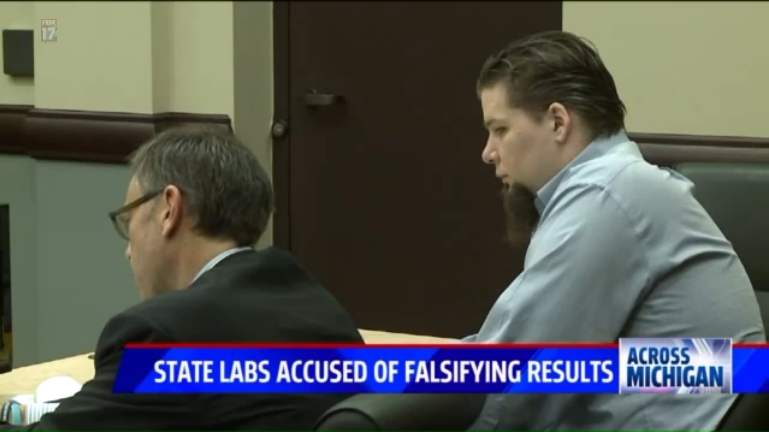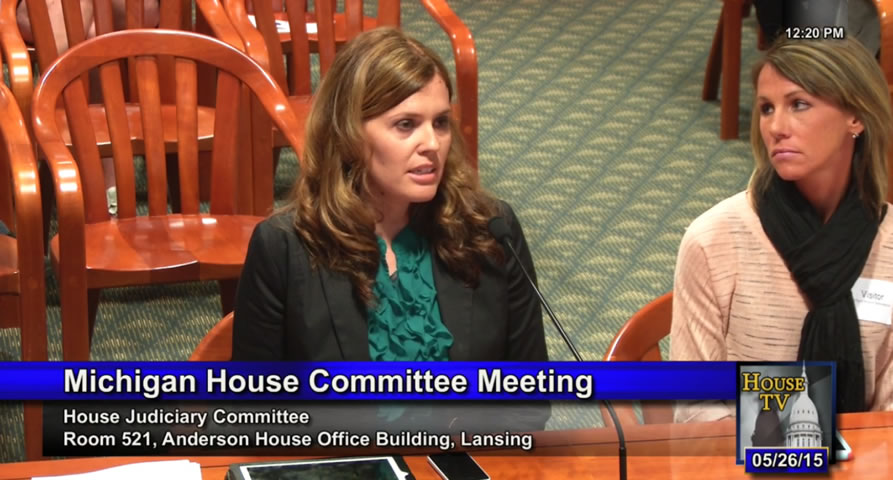
May 9, 2017 | Blog, Michigan Medical Marijuana Criminal Defense Attorney Michael Komorn, News, Uncategorized
One of the state’s most active medical marijuana specialist attorneys has been honored by the Criminal Defense Attorneys of Michigan (CDAM) with their “Justice For All” Award.

Of the thousands of criminal defense attorneys in Michigan, Komorn’s record of going after the big guy- and winning- propelled him into the top spot.
The award is described by CDAM below:
“The Justice for All award is given to recognize a particular extraordinary contribution of a group of individuals. This contribution can be in the form of legal representation or other extraordinary service.”
Komorn won a dismissal of charges in the Max Lorincz case, which involved a prosecution and removal of a child based on a tiny smear of alleged marijuana concentrate found by law enforcement.

This case, and Komorn Law’s digging into the back story, revealed the scientifically invalid and politically motivated changes in reporting marijuana concentrates as ‘origin unknown’ by the Michigan State Police Crime Lab.
The Lorincz case underscores what Komorn has been fighting for all along: an unyielding pursuit of the truth and exoneration for patients caught in a system designed to capture them.
Although the Lorincz case is the most recent and notable victory for Komorn Law, his other accomplishments stand out as well. Praise for Komorn’s career has been easy to obtain.
Some of Komorn Law’s highlights from 2015 include:
Having the entire Lapeer County Prosecutor’s office tossed off a medical marijuana case for being biased.
Challenging the Michigan State Police Crime Lab as they pervert scientific method to satisfy the political needs of prosecutors
Becoming involved as a Commission Member on the new Marijuana Law Section of the State Bar Association of Michigan
As well as many successful defenses of patients and caregivers registered with the Michigan Medical Marihuana Act (MMMA) in courts across Michigan.

Komorn is joined in his legal efforts by his longtime friend and aide, Chad Carr, who shares in the successes recognized by the Award Committee.
Komorn is also the Executive Director of the Michigan Medical Marijuana Association and the host of a weekly radio talk show dedicated to MMMA patients and the attorneys that represent them. The Planet Green Trees Radio Show has received notoriety nationally; interviews with legislators, scientists and attorneys for the past five years have offered revelations and brought clarity to what can be a very confusing medical marijuana program.
In the case of Max Lorincz, Michael was so moved by the unjust treatment of a man and his family, that he took the case pro-bono.
See the articles in the media
The Criminal Defense Attorneys have already posted the award notice and the dinner details. CDAM offers this description of their organization on the group’s website :
“Michael Komorn’s zealous advocacy and activism in the field of marijuana law has been impressive and has inspired many lawyers, including myself, to do the same through his accomplished example,” said Barton Morris, also a CDAM member.
“Michael is a pioneer and champion in marijuana law in Michigan.”

Nov 16, 2016 | Blog, News
DETROIT (AP) — Michigan sheriffs are paying for overtime and buying vests, guns, Tasers and vehicles with a little-known pot of state money that was set aside for medical marijuana enforcement.
They’re also leaving a lot of cash on the table, as only 18 of 83 counties this year applied for a slice of the $3 million.
“It’s mind-blowing to think they had this money out there and we had no clue about it,” said Sgt. James Every of the Ingham County sheriff’s office, which was eligible for $114,000 but didn’t apply.
Kent County, which is home to the western Michigan city of Grand Rapids, was eligible for $121,000 but also was unaware, Undersheriff Michelle Young said.
Advertisement
“We could absolutely use it for compliance and enforcement,” she said.
Michigan voters in 2008 approved the use of marijuana to treat certain illnesses. Nearly 225,000 people have state-issued cards, but the law has confused many and has led to significant legal disputes, including over how to obtain and store the drug. Large illegal growing operations have been busted around the state.
Since 2015, lawmakers have set aside money for sheriffs for medical marijuana enforcement and education. It’s administered by the Department of Licensing and Regulatory Affairs. Every county was eligible this year for a portion of the $3 million, based on the number of new cards or renewals in that county.
Seventeen counties spent $823,000 in 2016, according to a state report. The largest, Wayne and Oakland, spent a combined 67 percent of that figure.
Oakland spent $282,661, much of it on training and investigation overtime. The sheriff’s office bought a $31,000 van, a $30,000 pickup truck and a $6,800 cargo trailer.
“We didn’t have equipment,” Sheriff Mike Bouchard said. “We’d come across huge illegal grow operations — hundreds and hundreds of plants — and we’d have to rent trucks or trailers. … The grant helps alleviate some of the costs necessary to do these activities, but it’s just a sliver.”
According to the Oakland County Sheriff’s Office Sept. 1, 2016, submission to the state report, the department:
- Executed 59 search warrants,
- Executed 19 “knock and talks” with 13 found to be compliant, 2 had no evidence located and 4 found to be non-compliant.
- Initiated 19 educational contacts this year, with on criminal actions taken,
- Seized 2,961 marijuana plants — or 1,122 pounds — since Jan. 1.
Macomb County has spent about $100,000 over two years, much of it related to investigations and training. The sheriff’s office also bought laptops, vehicles and raid vests.
“I want the guys as protected as they can be,” Det. Sgt. Gary Wiegand said of vests.
Wayne County said it spent $171,618 on wages for dozens of officers conducting surveillance from January through September on 32 marijuana dispensaries in Detroit. More than 600 vehicles were stopped.
The grants were used in smaller counties, too. Sanilac spent $2,850 on five semi-automatic weapons. Antrim spent $479 on night vision binoculars. Cheboygan purchased Tasers.
Young, the Kent County undersheriff, believes the grants haven’t been promoted enough. The Department of Licensing and Regulatory Affairs declined to be interviewed.
“We have not been surprised by the participation rate as this was and still is a new program,” spokesman Michael Loepp said.
The deadline to apply for the next round of funding is Jan. 1.
Wiegand said Macomb County bought a trailer to haul and store illegal marijuana plants.
“We took more than 100 plants out of a person’s house,” he said. “It’s hard to put all that in the property room.”
One issue reported by the Oakland County Sheriff’s Office is that patients or caregivers are becoming better at cultivating marijuana and the plants are growing big enough to provide one pound of marijuana. With 12 plants per patient, they are going over the 2.5 ounces, the office reports.
“The MMMA does not provide a legal remedy for the patient or the caregiver to address this issue,” Oakland County Sheriff’s Lt. Brent Miles wrote.
Read the full state report online.
Read The State of Michigan Statistics and Report

Nov 14, 2016 | Blog, Medical Marijuana
2015 Michigan Medical Marihuana Statistics Document Link
The Department of Licensing and Regulatory Affairs (LARA) is responsible for the state’s regulatory environment and makes the delivery of services more efficient for consumers and business customers. LARA oversees the licensing and regulation of more than 1.2 million individuals and entities on an annual basis.

Oct 15, 2016 | Blog, News, Recent Victories, Uncategorized, Victories Project
Last night’s episode of VICELAND’s Weediquette focused on how police forces in Michigan are using civil asset forfeiture to target legally run medicinal marijuana businesses in the state.
Weediquette host Krishna Andavolu – about his reflections after filming the episode; an edited and condensed version of his comments are below.
READ THESE REGARDING SHATTUCK
Komorn Law – Shattuck Case
In Michigan, medical marijuana is legal—but last year, arrest rates were on the rise. Why? It seems like marijuana legalization is meant to at least take the drug out of the realm of the criminal justice system, but while doing research for this season of Weediquette, we found out that there’s still a strong incentive for police officers to go after legal marijuana growers in Michigan. The doctrine that the incentive is based off of is called civil asset forfeiture—which means that if a cop busts you, he or she can take your stuff in addition to throwing you in jail and charging you.
Even though medical marijuana growers have cards that say that they’re legally allowed to grow, civil asset forfeiture incentivizes police departments in Michigan to pursue really small technical violations
—For instance, if there’s a lock on a door that isn’t secure enough, or a key to a room in your grow house or dispensary is left on a counter when it should’ve been in a safe space. So law enforcement targets medical marijuana growers, finds enough evidence to justify a raid, takes all the growers’ stuff, and then makes an excuse for it after the fact.
It’s tough for Michigan cops. The state’s economy is pretty bad, and a lot of their police departments aren’t funded particularly well—so the police are using the doctrine of civil asset forfeiture to target mom-and-pop businesses. One of those businesses was run by the Shattucks, a family we visited who decided to go into the medical marijuana business because they saw people using it and thought it would be a good business to try for a couple of years to raise some capital to go into real estate. They were after the American dream, small business ownership.
However, the St. Clair County drug task force got wind of what they were doing, raided their grow facility, dispensary, and home, and took more than $80,000 worth of their goods. Losing the money and goods was bad enough—but their kids were also at home when the SWAT team came through the door, so their nine-year-old daughter is the one who saw the door broken down and men with guns rushing in.
You could look at the Shattucks and say, “I’m sure they were doing something wrong.” But a SWAT team seems like a disproportionate reaction. It’s an issue of how you implement medical marijuana legalization, but also of what we ask for in our community policing. What’s the relationship between those who are being policed and the police themselves? How do you balance making sure that the marketplace is legitimate while also respecting the people who are already operating legitimately in the marketplace? The Shattucks did everything they could to show the cops that they were doing the right thing—they met with the police department and showed the cops all their paperwork—but that didn’t stop the police from going after them two months later.
Another family we talked to, the Fishers, were in a hearing about a similar criminal case against them, and under cross-examination, the police officer who conducted the raid was asked if he questioned the family about whether they had medical marijuana cards—and he said no. There aren’t lawmakers who are trying to crack down on this stuff, so in a lot of cases drug task forces have no legislative oversight, meaning it’s up to individual cases in court to set any sort of precedent.
On Weediquette, we cover a lot of different stories—stories about medicine and recreational drug use—and this story is about how pot has always made it easy for law enforcement to go after vulnerable communities. We’re on a trajectory where medical marijuana and marijuana in general is going to become legal—it feels inevitable and that the war on drugs will also inevitable fade away—but stories like this bring to light that there’s a lot to still fight for.
WATCH THE TV EPISODE
https://www.viceland.com/en_us/show/weediquette-tv

Sep 26, 2016 | Blog, Komorn Law Blog, Medical Marijuana, Michigan Medical Marijuana Act, News
AN ACT to establish a statewide monitoring system to track marihuana and marihuana products in commercial trade; to monitor compliance with laws authorizing commercial traffic in medical marihuana; to identify threats to health from particular batches of marihuana or medical marihuana; to require persons engaged in commercial marihuana trade to submit certain information for entry into the system; to provide the powers and duties of certain state departments and agencies; to provide for remedies; and to provide for the promulgation of rules.
The People of the State of Michigan enact:
Sec. 1. This act shall be known and may be cited as the “marihuana tracking act”.
Sec. 2. As used in this act:
(a) “Department” means the department of licensing and regulatory affairs.
(b) “Licensee” means that term as defined in section 102 of the medical marihuana facilities licensing act.
(c) “Marihuana” means that term as defined in section 7106 of the public health code, 1978 PA 368, MCL 333.7106.
(d) “Registered primary caregiver” means that term as defined in section 102 of the medical marihuana facilities licensing act.
(e) “Registered qualifying patient” means that term as defined in section 102 of the medical marihuana facilities licensing act.
(f) “Registry identification card” means that term as defined in section 3 of the Michigan medical marihuana act, 2008 IL 1, MCL 333.26423.
(g) “Statewide monitoring system” or “system” means an internet-based, statewide database established, implemented, and maintained directly or indirectly by the department that is available to licensees, law enforcement agencies, and authorized state departments and agencies on a 24-hour basis for all of the following:
(i) Verifying registry identification cards.
(ii) Tracking marihuana transfer and transportation by licensees, including transferee, date, quantity, and price.
(iii) Verifying in a commercially reasonable time that a transfer will not exceed the limit that the registered qualifying patient or registered primary caregiver is authorized to receive under section 4 of the Michigan medical marihuana act, 2008 IL 1, MCL 333.26424.
Sec. 3. (1) The department shall establish a statewide monitoring system for use as an integrated marihuana tracking, inventory, and verification system. The system must allow for interface with third-party inventory and tracking systems as described in section 207 of the medical marihuana facilities licensing act to provide for access by this state, licensees, and law enforcement personnel, to the extent that they need and are authorized to receive or submit the information, to comply with, enforce, or administer this act; the Michigan medical marihuana act, 2008 IL 1, MCL 333.26421 to 333.26430; or the medical marihuana facilities licensing act.
(2) At a minimum, the system must be capable of storing and providing access to information that, in conjunction with 1 or more third-party inventory control and tracking systems under section 207 of the medical marihuana facilities licensing act, allows all of the following:
(a) Verification that a registry identification card is current and valid and has not been suspended, revoked, or denied.
(b) Retention of a record of the date, time, quantity, and price of each sale or transfer of marihuana to a registered qualifying patient or registered primary caregiver.
(c) Determination of whether a particular sale or transfer transaction will exceed the permissible limit established under the Michigan medical marihuana act, 2008 IL 1, MCL 333.26421 to 333.26430.
(d) Effective monitoring of marihuana seed-to-sale transfers.
(e) Receipt and integration of information from third-party inventory control and tracking systems under section 207 of the medical marihuana facilities licensing act.
(3) The department shall promulgate rules to govern the process for incorporating information concerning registry identification card renewal, revocation, suspension, and changes and other information applicable to licensees, registered primary caregivers, and registered qualifying patients that must be included and maintained in the statewide monitoring system.
(4) The department shall seek bids to establish, operate, and maintain the statewide monitoring system under this section. The department shall do all of the following:
(a) Evaluate bidders based on the cost of the service and the ability to meet all of the requirements of this act; the Michigan medical marihuana act, 2008 IL 1, MCL 333.26421 to 333.26430; and the medical marihuana facilities licensing act.
(b) Give strong consideration to the bidder’s ability to prevent fraud, abuse, and other unlawful or prohibited activities associated with the commercial trade in marihuana in this state, and the ability to provide additional tools for the administration and enforcement of this act; the Michigan medical marihuana act, 2008 IL 1, MCL 333.26421 to 333.26430; and the medical marihuana facilities licensing act.
(c) Institute procedures to ensure that the contract awardee does not disclose or use the information in the system for any use or purpose except for the enforcement, oversight, and implementation of the Michigan medical marihuana act, 2008 IL 1, MCL 333.26421 to 333.26430, or the medical marihuana facilities licensing act.
(d) Require the contract awardee to deliver the functioning system by 180 days after award of the contract.
(5) The department may terminate a contract with a contract awardee under this act for a violation of this act. A contract awardee may be debarred from award of other state contracts under this act for a violation of this act.
Sec. 4. The information in the system is confidential and is exempt from disclosure under the freedom of information act, 1976 PA 442, MCL 15.231 to 15.246. Information in the system may be disclosed for purposes of enforcing this act; the Michigan medical marihuana act, 2008 IL 1, MCL 333.26421 to 333.26430; and the medical marihuana facilities licensing act.
Enacting section 1. This act takes effect 90 days after the date it is enacted into law.
Enacting section 2. This act does not take effect unless House Bill No. 4209 of the 98th Legislature is enacted into law.
This act is ordered to take immediate effect.
STATE OF MICHIGAN – 98TH LEGISLATURE – REGULAR SESSION OF 2016
Introduced by Rep. Kesto
Michigan Medical Marihuana Laws are constantly changing. Please Research New Laws and Updates
Go Here for Updates and Link to Current MMA Laws
Link to Current Registry Information
Link to MMMA Act and Updates via LARA (State of Michigan)








